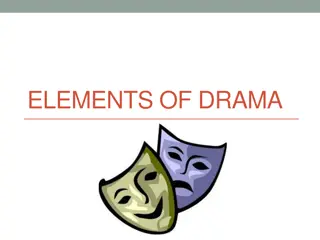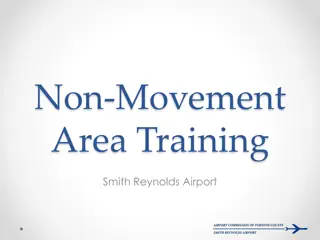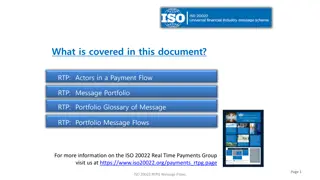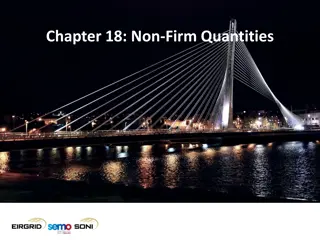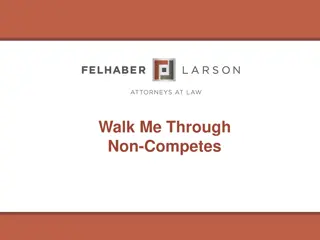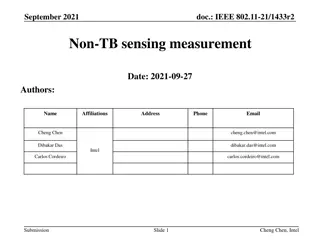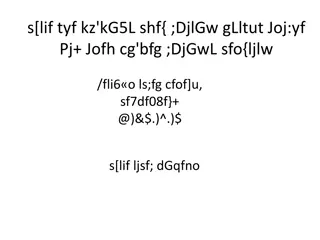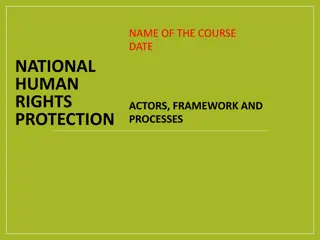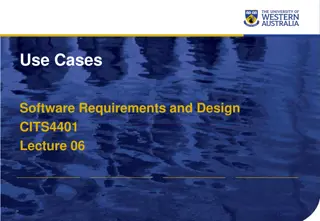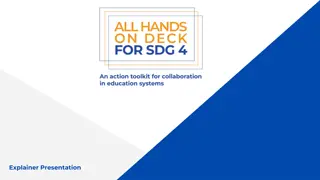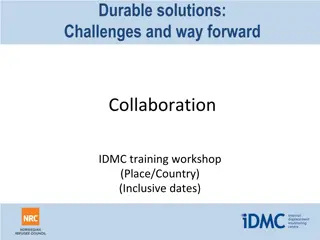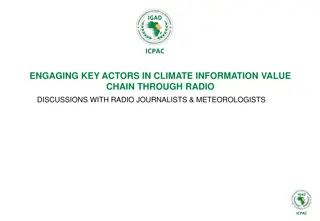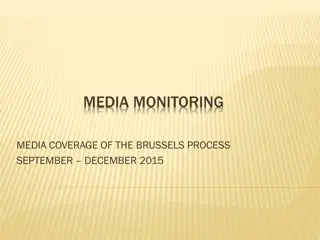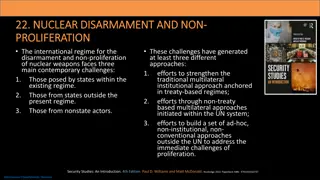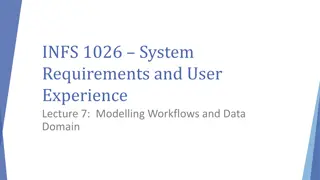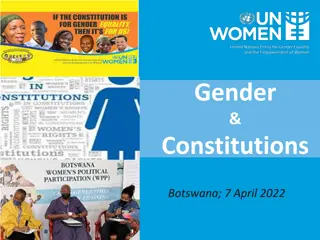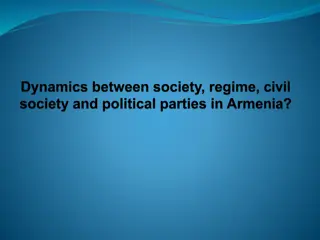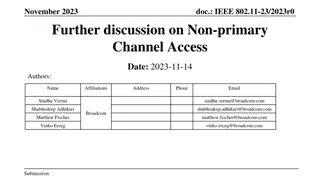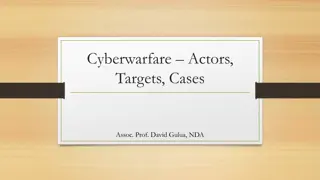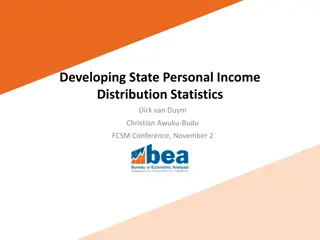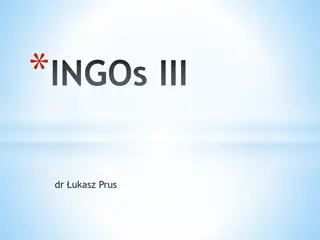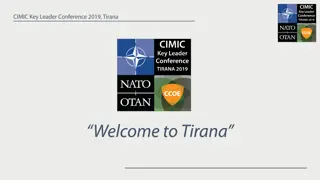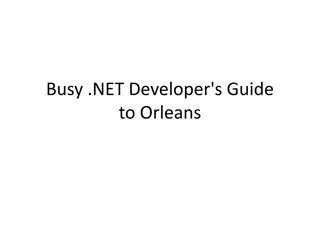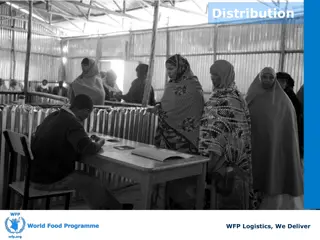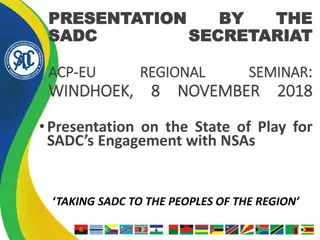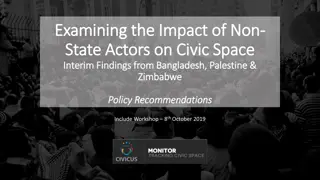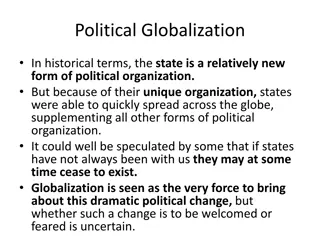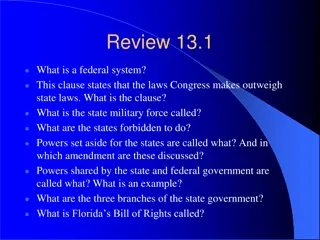Understanding the Elements of Drama and Theater History
Drama, originating from the Greek verb "dran," involves acting and storytelling in front of an audience. Explore the key aspects, from the Globe Theater in London to dramatic structure, actors, and speech forms like dialogue and monologue. Learn about the crucial components such as playwrights, acto
4 views • 22 slides
Establishing Safety Standards in Non-Movement Areas at Smith Reynolds Airport
This guide outlines the purpose, definitions, rules, and safety measures for operating vehicles in non-movement areas at Smith Reynolds Airport. It emphasizes standardized ground movement practices to ensure the safety of airport patrons, reduce the risk of injury, and maintain a high level of safet
1 views • 12 slides
International Law of War: Nuremberg Principles and Accountability
The Nuremberg Principles, derived from the trials of Nazi officials for war crimes, establish accountability in international law. These principles hold individuals responsible for committing acts considered crimes under international law, regardless of their position or orders received. The assumpt
2 views • 22 slides
Understanding Non-Aqueous Solvents: Types and Classification
Inorganic non-aqueous solvents play a crucial role in chemical research and industry. This article by Dr. Princy K.G. delves into the classification of solvents based on protonicity, polarity, and aqueous vs. non-aqueous nature. It explores the types of non-aqueous solvents, such as protonic and non
1 views • 29 slides
Real-Time Payments: Actors and Message Flows Overview
This document provides an overview of the actors involved in a payment flow and the message portfolio in Real-Time Payments (RTP). It includes details on various actors like Instructing agent, Forwarding agent, Ultimate Debtor, Reimbursement agents, and more. The provided message flows illustrate th
1 views • 12 slides
Understanding Non-Firm Quantities in Electricity Markets
Non-Firm Quantities in electricity markets involve units with non-firm access not being compensated for their non-firm capacity not getting accommodated on the system. The concept of Firm Access Quantity plays a key role in determining compensation levels for units, with differences in implementatio
0 views • 6 slides
Understanding Non-Compete Agreements: Enforceability and Requirements
Non-compete agreements are commonly used in the United States to protect businesses from competition by former employees. To be enforceable, these agreements must meet certain requirements, including independent consideration, protection of legitimate business interests, and reasonableness in scope,
0 views • 26 slides
Comparison of Trigger-based vs. Non-Trigger-based Sensing Measurement in IEEE 802.11
The document discusses the differences between Trigger-based (TB) and Non-Trigger-based (Non-TB) sensing measurement instances in IEEE 802.11 standards, focusing on who initiates the sensing measurement. TB sensing is initiated by the AP, while Non-TB sensing is initiated by a non-AP STA, enabling o
6 views • 13 slides
Financial Services Institutions Support Value Chain Actors
Financial services institutions play a vital role in supporting various actors within the value chain, including exporters, wholesalers, banks, processors, and non-bank financial institutions. This ecosystem also involves technical training, business support, local traders, private investors, specia
0 views • 30 slides
Understanding National Human Rights Protection Systems
Explore the essential elements of national human rights protection systems including actors, frameworks, and processes. Learn about the foundational role of the state, legal frameworks, institutions, and the involvement of non-state actors in upholding human rights. Reflect on the importance of dome
0 views • 35 slides
Understanding UML Use Cases for Software Requirements and Design
Use cases play a crucial role in defining software requirements and design. They outline interactions between actors and the system, describing functional requirements from the user's perspective. Identifying actors, their interactions, and goals are essential when writing a use case. This process h
0 views • 24 slides
Overview of US Foreign Policy Decision-Making Process
The US foreign policy decision-making process involves various actors and dynamics such as the President, Congress, interest groups, media, and public opinion. The Constitution outlines key provisions related to war powers, treaties, and appointments. The balance of power between the branches influe
2 views • 15 slides
All Hands On Deck For SDG 4: A Strategy for Inclusive Education Planning
The All Hands On Deck For SDG 4 Initiative aims to bridge the gap between state and non-state education providers to enhance planning, dialogue, and implementation in underserved communities. Through case studies and a strategic guide, the initiative seeks to create a future where governments levera
1 views • 26 slides
Best Actors Headshot Photography in New Cross
Are you looking for the Best Actors Headshot Photography in New Cross? Then contact Tom Trevatt Photography. They take artistic photos of your face that help you make a meaningful connection when you need it most. Their services include headshot phot
0 views • 6 slides
Overview of Criminal Justice Realignment in California
California's Criminal Justice Realignment, implemented in September 2011, involves shifting custody of certain non-violent, non-serious, non-sex offenders to county control. This initiative also establishes Postrelease Community Supervision and changes the state parole revocation process. The reform
3 views • 58 slides
Collaboration for Durable Solutions in Humanitarian Settings
This workshop addresses challenges and opportunities in achieving durable solutions for refugees and internally displaced persons. It emphasizes the importance of collaboration among various stakeholders, including humanitarian and development actors, to ensure long-term recovery and sustainable pea
0 views • 21 slides
Engaging Key Actors in Climate Information Value Chain Through Radio Discussions
In this discussion, the importance of engaging key actors along the climate information value chain through radio discussions is emphasized. The symbiotic relationship between radio journalists and meteorological authorities is highlighted, as well as the key actors involved such as Government Agenc
0 views • 22 slides
The Vital Role of Religious Institutions in Supporting Immigrants
Religions and immigration are interlinked in modern societies, where religions play a significant role in providing services, defending rights, and supporting the social cohesion of immigrants. Mainstream religious institutions serve as key actors in offering assistance, advocating for migrant right
2 views • 14 slides
Analysis of Media Coverage on the Brussels Process (Sep-Dec 2015)
This analysis delves into the media monitoring of the Brussels Process from September to December 2015. It focuses on the monitoring objective, airtime distribution among TV actors, duration dedicated to the Brussels Agreement, number of reports per media outlet, and reporting statistics. The resear
0 views • 37 slides
Contemporary Challenges in Nuclear Disarmament and Non-Proliferation Regime
The international regime for nuclear disarmament and non-proliferation faces challenges from states within and outside the regime, as well as non-state actors. Various approaches are being utilized to address these challenges, including strengthening multilateral institutions, non-treaty-based multi
0 views • 12 slides
Modelling Workflows and Data Domain in System Requirements and User Experience
In this lecture, the focus is on modelling workflows and data domain in the context of system requirements and user experience. The topics covered include recap of use cases, use case diagrams, descriptions, events initiated by stakeholders, defining elements for each use case, use case diagrams, an
0 views • 56 slides
Gender and Constitutions: Key Insights and Policy Implications
Constitutions play a pivotal role in shaping systems of governance and accountability, presenting opportunities as well as challenges for advancing gender equality. A shift towards gender-specific language in constitutional content has been observed globally since the 1980s. Examples from countries
0 views • 22 slides
Improving Attainment and Progress of Disadvantaged Pupils in Sheffield
Attainment and progress of disadvantaged pupils in Sheffield show an improving trend across key stages, although the gaps between disadvantaged and non-disadvantaged students are not closing fast enough. Data suggests that disadvantaged pupils with low prior attainment are making better progress in
0 views • 29 slides
Understanding Non-Profit Accounting Essentials
Learn the basics of non-profit accounting, including what defines a non-profit organization, common types of non-profits, governance structures, and legal responsibilities. Discover key insights on IRS and state requirements for non-profits in this informative presentation by Jessica Sayles, CPA fro
0 views • 55 slides
Main Actors Society and Regime Characteristics Analysis
Analysis reveals a society characterized by passivity, apathy, and patron-client relationships, with emigration as a major form of social protest. The regime exhibits consolidating authoritarianism, convergence of business and political elites, and systemic corruption. Oligarchic dominance, small an
0 views • 6 slides
Further Discussion on Non-primary Channel Access in IEEE 802.11
This contribution delves into the utilization of non-primary channels for access in IEEE 802.11 networks, focusing on enhancing frequency reuse, adhering to ETSI standards, evaluating CCA capability types, and analyzing non-ideal deployment scenarios. It discusses the complexity and benefits of non-
0 views • 26 slides
Understanding Cyberwarfare: Actors, Targets, Cases
Cyberwarfare involves actions by nation-states to penetrate others' computers or networks for causing damage. It extends classic warfare and is characterized by its speed, global nature, and comprehensive impact. State and non-state actors play significant roles, engaging in cooperation for various
0 views • 10 slides
Developing State Personal Income Distribution Statistics
This project aims to create a distributional account for State Personal Income, allowing for the analysis of inequality by state and over time. Using various data sources such as BEA aggregates and IRS statistics, the distributional model provides insights into state-level income inequality. Census
0 views • 17 slides
Role of Environmental INGOs in International Law Development
Non-state actors, particularly Environmental International Non-Governmental Organizations (EINGOs), have played a crucial role in developing international environmental law over the past few decades. INGOs emerged due to government inaction in addressing environmental degradation, mobilizing public
0 views • 84 slides
Understanding Use Cases and Actors in System Design
Explore the concept of use cases in system design, including user goals versus interactions, system boundaries, actors, and how they all come together in use case diagrams. Learn how use cases capture user-visible functions, achieve discrete goals, and represent the interactions between actors and t
0 views • 20 slides
Tactical Approach to Enhancing CIMIC Leadership and Personnel Development
The strategic military objectives focus on improving leadership, motivation, and professionalism within the CIMIC framework. Key goals include effective leadership improvement, attracting qualified personnel, and enhancing professionalism to support NATO CIMIC efforts. The end state aims for well-mo
0 views • 11 slides
Exploring Microsoft Orleans: A .NET Developer's Guide
Dive into the world of virtual actors and distributed system design with Microsoft Orleans, a powerful framework for building scalable and resilient applications in .NET. Learn about key concepts like grains, silos, and virtual actors, and discover how Orleans simplifies the development of complex d
0 views • 37 slides
Comprehensive Lesson on Distribution Planning and Setup
This detailed lesson plan covers essential aspects of distribution systems, planning, setups, layouts, and actors involved in the distribution cycle. Participants will learn about distribution types, considerations, and evaluation criteria to ensure successful distribution operations. The session in
0 views • 22 slides
Enhancing Civil Society Engagement in SADC Region
Exploring the State of Play for SADC's Engagement with Non-State Actors (NSAs) during the ACP-EU Seminar in Windhoek. The presentation highlights the importance of strengthening partnerships with civil society organizations to influence policy agendas for regional development.
0 views • 23 slides
Impact of Non-State Actors on Civic Space: Interim Findings & Recommendations
Examining the impact of non-state actors on civic space in Bangladesh, Palestine, and Zimbabwe reveals the drastic effects of pro-government militias, GONGOs, and state-owned media restrictions on NGO activities. Recommendations include resolving conflicts, flexible long-term support, addressing act
0 views • 5 slides
The Importance and Functions of Scenery in Theatre Productions
Scenery in theater serves vital roles such as providing a stage for actors, setting the scene, revealing interrelationships, indicating production style, and following staging conventions. It helps create mood, atmosphere, and aids in focusing the audience's attention on the performance. Effective d
0 views • 26 slides
Enhancing Public Participation in Fiscal Policy Design and Implementation
Public participation in fiscal policy processes is essential for improving resource allocation, targeting policies to meet citizens' needs, empowering citizens, broadening dialogue, reducing corruption, enhancing service delivery, reforming state agencies, and increasing government legitimacy. This
0 views • 17 slides
The Impact of Globalization on State Sovereignty
Globalization has sparked debates on the decline of state sovereignty as international institutions and interconnectedness challenge traditional state powers. The shift towards a web of organizations raises questions on the future autonomy of states and the effectiveness of violence as a tool. Vital
0 views • 6 slides
Overview of State Government and State Legislatures in Florida
A federal system is a political framework where power is divided between a central government and individual states. In this system, laws created by Congress take precedence over state laws. The supremacy clause enforces this hierarchy. States are prohibited from actions like declaring war or mintin
0 views • 12 slides
Different Views of Collective Actors on Refugees in Greece
The MAREM project by a Greece group explores the diverse perspectives of collective actors on refugees in Greece, addressing migration policies, asylum services, and the situation of refugees in the country. With a focus on expert interviews and research results, the project delves into the complexi
0 views • 19 slides
